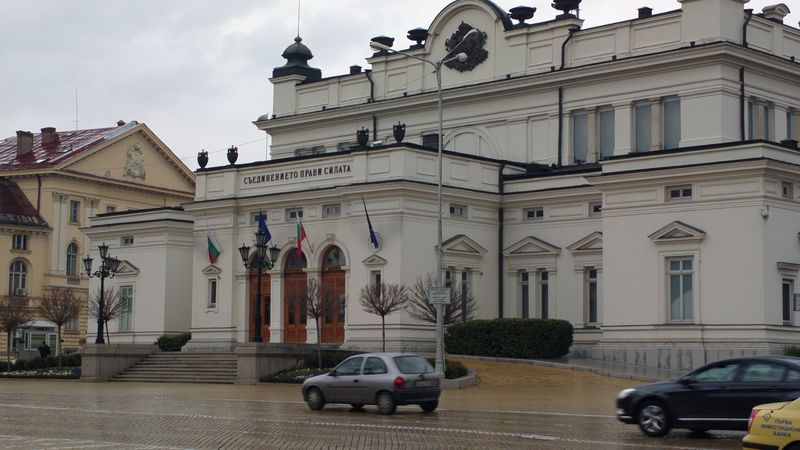The Bulgarian Elections’ Weathercock
Adelina Dankova, May 17, 2013
 Bulgaria held its early parliamentary elections on May 12th 2013. The period during the political campaign was marked by mistrust in the political process, discovery of 350 000 extra illegal ballots and wire-taping scandals. Regardless of the high expectations around this election, it seems that the country is still searching for a solution out of a political deadlock. According to the final vote distribution, the right wing party GERB will have 97 seats, Coalition for Bulgaria, including the socialist party BSP - 84, Movement for Rights and Freedom (MRF), supporting/representing mainly the interests of the minority Bulgarian Turks – 36 and the nationalist party Ataka - 23, which means that even if the last three political parties agreed on constituting a government, it will be a minority government. A coalition between MRF and Ataka seems impossible, but in Bulgarian politics nothing is certain and anything tends to be possible. Certainly, political parties might search for experts outside and thus form a government on a larger expert basis. The latter would be welcomed by the European partners, but does not ensure the political stability in the country.
Bulgaria held its early parliamentary elections on May 12th 2013. The period during the political campaign was marked by mistrust in the political process, discovery of 350 000 extra illegal ballots and wire-taping scandals. Regardless of the high expectations around this election, it seems that the country is still searching for a solution out of a political deadlock. According to the final vote distribution, the right wing party GERB will have 97 seats, Coalition for Bulgaria, including the socialist party BSP - 84, Movement for Rights and Freedom (MRF), supporting/representing mainly the interests of the minority Bulgarian Turks – 36 and the nationalist party Ataka - 23, which means that even if the last three political parties agreed on constituting a government, it will be a minority government. A coalition between MRF and Ataka seems impossible, but in Bulgarian politics nothing is certain and anything tends to be possible. Certainly, political parties might search for experts outside and thus form a government on a larger expert basis. The latter would be welcomed by the European partners, but does not ensure the political stability in the country.
According to the Central Election Commission (CEC), the distribution of votes creates a different balance in the new Bulgarian Assembly with GERB capturing 30.54% of the vote; the socialist Coalition for Bulgaria - 26.61%; MRF - 11.31%; Ataka - 7.30%. Other parties, which gained a significant percentage but did not reach the 4% election threshold were: National Front for the Salvation of Bulgaria - 3.70%; Bulgaria for Citizens’ Movement - 3.25%; Democrats for Strong Bulgaria (DSB) in a coalition with Bulgarian Democratic Forum - 2.93%; IMRO - Bulgarian National Movement - 1.89%; Leader - 1.74%; Order, Law and Justice - 1.67%, part of the previous Assembly, but did not make it this time. Voter turnout was 51.33%. During the Parliamentary elections in 2009 voter turnout was 60.20 % and GERB received 39.72% of the votes, BSP – 17.70%, MRF – 14.45%.
The votes from abroad
Totally, 110 632 Bulgarians voted in polling stations outside Bulgaria. MFR emerged as a first political power, according to the counted votes from abroad, and received 49.13%. The People’s Party for Freedom and Dignity (Korman Ismailov as chairman and Kasim Dal as Vice Chairman) in a coalition with the former ruling party in Bulgaria (2001-2005) – NMSS (National Movement for Stability and Prosperity of the former tsar) is the second political power, which received 8 806 votes from abroad. Korman Ismailov and Kasim Dal were former Members of Parliament, part of MFR parliamentary group. In 2011, both were expelled by MFR political body and later on, in December 2012, they founded their new party. Democrats for Strong Bulgaria, led by former Prime Minister Ivan Kostov (1997-2001), received 3 288 votes and is the third political power, according to the "foreign" votes.
The following data show explicitly that votes for political parties supporting/representing ethnic minorities/groups are growing significantly. If there are some allegations that votes were organised or controlled, the question must be discussed by the investigation institutions in Bulgaria. For DSB voters there is a good and a bad news. On one hand, it is good news that the political party, considered to represent the middle class in Bulgaria - the small and medium business - is ranked 3rd abroad. On the other hand, it seems citizens with right political views, who are no longer living in Bulgaria, do not in fact participate directly in its economic development and steady prosperity.
The ruling conservative party GERB (2009-2013) resigned in mid-February 2013 after massive protests throughout the country caused by the high cost of electricity and escalating public discontent with monopolies in Bulgaria. The temporary political crisis was shaded by a caretaker cabinet and early appointed parliamentary elections. In addition, a wire-tapping scandal of high-ranking politicians and representatives of the judiciary branch, and the discovery of 350 000 counterfeit election ballots at the printing company Multiprint were linked to GERB by some media.
The far right political formations
A tendency is spreading throughout Europe: homophobic political parties and far right political formations increase their seats in National and European parliaments, delivering messages based on anti-immigrant rhetoric, euroscepticism and populism. For instance, Sverigesdemokraterna in Sweden (with 20 out of 349 seats in the National Assembly (Riksdag) since 2010) or the UK Independence Party with 11 MEP in the European Parliament out of 73 seats for UK.
According to the results in Bulgaria, Ataka is in the lead and will enter the Assembly. However, other nationalist parties such as National Front for the Salvation of Bulgaria and the IMRO – Bulgarian National Movement will find no place in the National Assembly. Those nationalist parties were not able to make it into the Parliament but their performance is not to be underestimated, especially considering their ability to rally better voter support and earn enough votes in the 2014 EU elections to produce representatives.
The political surprise
Contrary to sociological data and forecasts, Bulgaria for Citizens Movement did not enter the National Assembly. The former EU Commissioner for Consumer Protection Meglena Kuneva’s party was pointed by political analysts and pollsters as a decisive partner in a potential coalition government. However, the current situation has significantly changed. The “old and traditional” right-leaning political parties such as Union of the Democratic Forces (UDF) and Democrats for Strong Bulgaria (DSB) could not reach the election threshold and will be left out of the Assembly. Thus, a significant amount of  people, described as middle class, educated with an average income, representatives of small and medium enterprises will be left without any representation in the Assembly.
people, described as middle class, educated with an average income, representatives of small and medium enterprises will be left without any representation in the Assembly.
The sensitive questions
Although the final report of the OSCE international observers of the elections is yet to be published, the preliminary statement suggests that “Bulgaria’s early parliamentary elections on 12 May were held in a competitive environment, fundamental freedoms were respected, and the administration of elections was well managed, although the campaign was overshadowed by a number of incidents that diminished trust in state institutions and the process was negatively affected by pervasive allegations of vote-buying”. Words and phrases such as mistrust, lack (of) or weakened public confidence in the electoral process, media ownership lacks transparency, allegations of vote-buying, inflammatory and xenophobic rhetoric at times during the campaign are among the most frequent definitions described by the observers in their preliminary annotations. These disturbing observations will be probably included in the final report with main conclusions and recommendations. In addition, Miklós Haraszti, the Head of the OSCE/ODIHR long-term election observation mission stated: “There were serious violations during this campaign. […] In order to restore the trust of Bulgarian citizens in their democratic process, the cycle of impunity must be broken.”
OSCE observers once again turned their attention to the wire-tapping scandals; the discovered extra ballots; media ownership and its lack of transparency; and the lack of trust, which weakens the election process. These questions need to be addressed in Brussels. EU leaders and particularly the EPP leaders, who recognise GERB as a conservative party, should be aware of these disturbing events. Without assistance and/or pressure from the European Parliament some deeply rooted manoeuvres dating back to communist times will take the lead and any positive results will no longer be achievable. Nevertheless, Bulgarian internal politics is its own business, but if the signals of anxiety from Brussels are not recognisable and alarming, the process of improving and democratisation gets slower and starts to slip over.
Should I stay or should I go?
Will there be a huge immigration wave of promising, well educated Bulgarians is still valid question. Perhaps, one of the biggest fears of the UK’s Independence Party leader Nigel Farage or of British Prime-Minister David Cameron is that huge flows of Bulgarians will head to the UK and draw on its welfare system. Bulgaria has already experienced emigration on a massive scale in the beginning of the 1990s. However, this time the social media overflowed with statuses of visibly promising, well-educated Bulgarians, eager to immigrate immediately after the elections results as a sign of protest to the polls. The civil discontent is noticeable, the questions would be whether these citizens will have the courage to leave the country and to experience another life abroad with its advantages and disadvantages. The answer is due in the foreseeable months.
The results from Bulgaria’s last elections undoubtedly drew two main conclusions: some representatives of the so called middle class (elites) of Bulgarians are dissatisfied with the economic and political situation, but a majority of citizens delegate trust to the same political actors. The interpretation might be ambiguous: either the parties do not deserve their promising and well-educated people or vice versa. The current state of politics is undoubtedly very delicate in the poorest country of the EU “club of the rich”. Any inappropriate move might lead to political instability and new elections in autumn, as some of the scenarios in Hungary, Romania or Slovakia showed in the recent years. Certainly, parties should be careful with their Bulgarian elites, which turned out to be a weathercock of these elections. Their steps might result in a significant brain-drain, which might lead to more severe economic, political and demographic consequences in long-term perspective. The latter could result in increasing of the nationalistic forces within the country, strengthening the rhetoric of hatred on both governmental and European level.